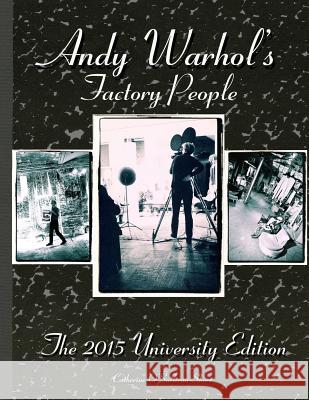Andy Warhol's Factory People The 2015 University Edition: Welcome to the Silver Factory, Speeding Into the Future, Your 15 Minutes Are Up » książka
Andy Warhol's Factory People The 2015 University Edition: Welcome to the Silver Factory, Speeding Into the Future, Your 15 Minutes Are Up
ISBN-13: 9781511400671 / Angielski / Miękka / 2015 / 426 str.
Andy Warhol's Factory People The 2015 University Edition: Welcome to the Silver Factory, Speeding Into the Future, Your 15 Minutes Are Up
ISBN-13: 9781511400671 / Angielski / Miękka / 2015 / 426 str.
(netto: 189,86 VAT: 5%)
Najniższa cena z 30 dni: 198,81
ok. 16-18 dni roboczych
Dostawa w 2026 r.
Darmowa dostawa!
Andy Warhol's Factory People, The 2015 University Edition, is a revised, comprehensive 440-page, three-part oral history that tells the story of Warhol's famous 1960s Silver Factory as told by the friends, superstars, and foes who worked with, partied with, filmed with, and slept with Andy from 1964 to 1968 in the Factory. Based on over 40 hours of interviews, the edition contains: Book I Welcome to the Silver Factory, Book II Speeding into the Future, Book III Your 15 Minutes are Up. Over 400 photographs add insight and interest to the oral accounts and the author's related comments. Andy Warhol and his Factory. Ever wonder what all the fuss was (and still is) about? So much has been written about this art colossus-his obsession with celebrity, his silk screens of Marilyn and Liz and Brando, his endless Campbell soup cans and Coca-Cola bottles, his mind-numbing movies-that there are those who feel his fifteen minutes of fame should have been up long ago. Instead, he has become a lasting icon of popular taste. As the New Yorker's art critic Peter Schjeldahl wrote in his review of the Metropolitan Museum's huge 2012 show of Warhol and his impact on 60 other artists, "Like it or not, we are all Warholian." The familiar soup cans, along with the cokes, cows, fatal car crashes, flowers and Brillo boxes, were all prominently featured in the three-hour documentary, Andy Warhol's Factory People, which spans the years l964 to l968, arguably the artist's busiest and most creative period. As were the familiar superstars he made famous, superstars like Viva and Edie Sedgwick and Ultra-Violet and Nico and the Velvet Underground. But what set apart the film, and now distinguishes the book from the many other books about Warhol, is that Director Shoee and the Producers also tracked down the forgotten Factory people, the remarkable and often bizarre assortment of people who were behind Warhol's unprecedented rise to spectacular success. These people often paid a price for linking their destinies to the gifted but frustrated graphic artist who decided in the early sixties to "start Pop art" because he "hated" Abstract Expressionism.
Zawartość książki może nie spełniać oczekiwań – reklamacje nie obejmują treści, która mogła nie być redakcyjnie ani merytorycznie opracowana.











